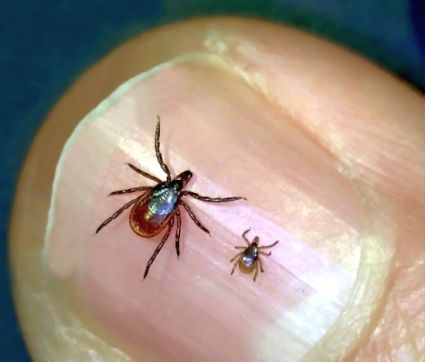
Are You Tick Smart?

While the Belgrades are beautiful and have many outdoor options for activities, they are also home to ticks. Maine’s tick season is off to a strong start due to a milder winter and wet spring, leading to increased tick activity and the risk of tickborne diseases like Lyme disease.
Ticks are active here starting in April and going into Fall. The season is also starting earlier and lasting longer due to warmer average temperatures.
Lyme disease is the most commonly reported vector-borne illness in the United States with approximately 30,000 new cases reported annually. The first documented case of Lyme disease in Maine was identified in 1986 and the incidence has been steadily increasing within the state ever since.
Maine has as many as up to 15 different kinds of ticks, but it is the black-legged tick (commonly known as the deer tick) that can transmit the following diseases: Lyme, anaplasmosis, babesiosis, hard tick relapsing fever, Powassan encephalitis, and alpha-gal (red meat) allergy.
Maine is home to the University of Maine Cooperative Extension tick lab. Located in Orono, the lab offers testing to the Maine community. This is an invaluable resource, as the lab will check a tick (cost is $20) found on you, or a loved one and test it for tick-borne pathogens. This allows for proper treatment, and peace of mind. Having lost a family member to a tick borne illness, I am always educating the Maine community about the lab. Do not flush the tick — save it and send it.
Here in Kennebec county in 2024 the lab tested 212 ticks. Ninety-one tested positive for Borrelia burgdorferi (Lyme), 21 tested positive for Anaplasma phagocytophilum (anaplasmosis), 24 tested positive for Babesia microti (babesiosis) and three tested positive for Powassan. Some of these diseases are bacterial and can be treated with antibiotics and others, like Powassan, are viral and don’t respond to antibiotics.
What can you do to protect yourself? Prevention is key!
- Wear light-colored clothing to make ticks easier to detect.
- Wear long pants tucked into socks or boots and tuck your shirt into your pants to keep ticks on the outside of your clothes.
- Use products that contain permethrin to treat clothing and gear
- Other tick repellents recommended by the Centers for Disease Control and Prevention (CDC) include picaridin, oil of lemon eucalyptus, and IR3535.
- The use of repellents that contain 20-30% DEET on exposed skin and clothing can effectively repel ticks for several hours.
- Tumble dry clothing on high heat for 10-20 minutes.
- Do your TICK CHECK! They especially migrate to arm pits, behind the knees, between the legs, in and around the ears, belly button and hair.
For more information on the UMaine Cooperative Extension Tick lab you can look them up online or call (207) 581‑3880 or (800) 287‑0279
Download Full Newspaper: High Res | Low Res (Details…)
<— Previous Article • Summaries • Next Article —>
©2025 by Summertime in the Belgrades. All rights reserved.